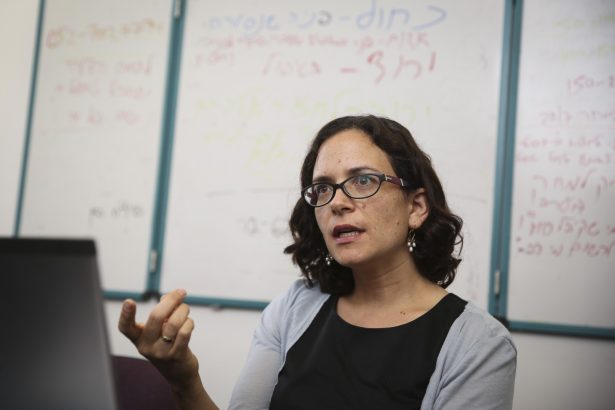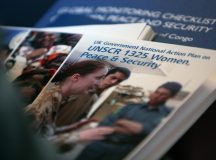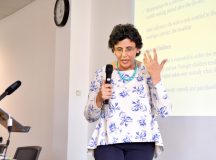Rachel Azaria is a Modern Orthodox Israeli politician, currently serving as a member of the Knesset for Kulanu. In this interview with deputy editor Calev Ben-Dor, MK Azaria describes six key challenges that women from all sectors face in Israel today and on what is being done in the Knesset to help women meet those challenges and create a more equal society.
Women in Israel are enjoying many benefits that previous generations campaigned for. Glass ceilings are being broken – the current Governor of the Bank of Israel is female, as are the current and former Chief Justices, while there are more women in politics than ever before (although still not enough). And in all of the five-year plans discussed in the Foreign Affairs and Defence Committee, the Israel Defence Forces (IDF) is clear about the importance of integrating women in the army.
But the picture is mixed. Sometimes women experience a backlash against many of these advances, and women still face several challenges.
The first challenge is sexual abuse and harassment. There was a lot of legislation between 15 and 20 years ago, but it is only now being implemented and becoming an integral part of Israeli society. Still, a president is sitting in jail for crimes he committed against women and progress is being made.
The second challenge is childcare. Israel has a very high percentage of working women, especially in the Jewish sector, and we also have significantly higher birth rates than Europe. The trouble is that while our economy is based on the assumption that both parents work, we have not yet reconfigured policy on childcare accordingly.
I have been working on this issue for the past decade and this year we recently experienced breakthroughs – subsidising day care and after-school activities for children, improving the quality of the food distributed at these after-school activities, and ensuring an extra week of maternity leave. We also legislated that the sick days parents can take when their children are unwell can now be divided between father and mother. In Israel, employers begin covering sick days only after day three. The employee isn’t paid for the first day off work, the second day they are paid half, and from day three they are fully covered. But because most parents can’t afford for one of them to take off three consecutive days, often the mother would take off the first day (and not be paid), the father would take off the second day (and not be paid) and so on with the families ultimately losing money. The new legislation allows both parents to ‘join’ their days together.
In these ways, the government is slowly making it easier for young parents. Sometimes the legislation is adapted to what families were already doing in practice. Sometimes the legislation aims to encourage couples and families to adopt a more equal sharing in child rearing.
A third challenge is prostitution. This is a topic that hasn’t been talked about for many years in Israel. Now at least it is being discussed.
A fourth challenge is the relationship between religion and state and the contradictory impacts of the integration of the ultra-Orthodox into mainstream society. That integration is a good thing, but also means that the ultra-Orthodox are bringing demands anchored in their way of life, such as keeping distance from women, into mainstream society. Should we accept these demands as the price for the ultra-Orthodox to become a greater part of Israeli society? Perhaps the answer doesn’t need to be binary.
I went to the Supreme Court to battle (successfully) against the phenomenon of ultra-Orthodox women having to sit at the back of the bus on certain lines that ran in areas with a high ultra-Orthodox population. During the campaign, people asked me why I – a woman from the modern Orthodox sector – was leading on this issue when it didn’t directly affect me. I initially answered that as an Orthodox women, everything that takes place in the ultra-Orthodox world ultimately affects me. But as time went on I realised something else was at stake. Ultra-Orthodox women began calling me to thank me for the campaign. They told me that they were not leading the battle themselves only because the price they would have to pay within their own society would be too high, and they didn’t know if they had support in wider Israeli society. Once the position of Israeli society as a whole became clear – a woman being forced to sit at the back of a bus is unacceptable – the ultra-Orthodox women did ultimately join us.
Fifth, and related to this slow integration of the ultra-Orthodox, is the creeping drive to segregate and exclude women in the public sphere. This issue affected me personally several years ago when I was standing for election in Jerusalem. Like every candidate, I wanted to have my photo on the bus for a municipal campaign. However, during a discussion with a bus company, I was told that there are no women on buses in Jerusalem due to fears of violence from the ultra-Orthodox community. We went to Channel 2 News, and a lawyer offered to represent me in the Supreme Court, who ultimately ruled that what appears in the public sphere in Jerusalem shouldn’t be affected by threats of violence. It took three more years of campaigning about women’s right to sit where they want on a bus and their right not to be forced to walk on a separate side of the street in an ultra-Orthodox neighbourhood, but ultimately legislation was changed.
Change is coming to Orthodoxy in a variety of areas. Ritual bathing in mikvehs and the presence of attendants is already changing, kashrut is on the verge of change, and there is a debate, although we’re not there yet, on Shabbat. Marriage, divorce and conversion remain more complicated. This will take time and is connected to a larger question of the State of Israel defining what it means to be a Jewish state and the role of Jewish law, so it will take time. Israel in 2018 is trying to design a Jewish way of life that is based not on diaspora realities but on a sovereignty that we have not experienced for 2000 years. A central question for this new sovereign reality is the role that religion should have within this Jewish state. That debate goes on.
The sixth challenge concerns the so-called ‘honour killings’ (although there is nothing honourable about them) in Arab society in Israel.
It is very hard for women who are part of a smaller and traditional group (such as the ultra-Orthodox or Arab) that tries hard to maintain internal cohesion and identity against wider society to promote change on issues that directly affect them. Moreover, in such societies, women’s issues often come low down on the list of priorities.
So, a mixed picture: huge advances in women’s equality and participation in society, but serious ongoing challenges that the Knesset and civil society must tackle.






































Comments are closed.